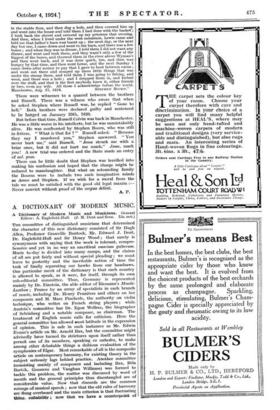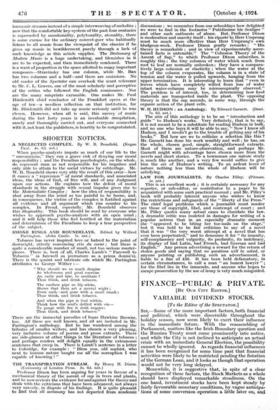A DICTIONARY OF MODERN MUSIC.
A Dictionary of Modern Music and Musicians. General Editor : A. Eaglefiekl-Hull. (J. M. Dent and Sons. 35s. net.) THE committee of distinguished musicians that determined the character of this new dictionary consisted of Sir Hugh Allen, Professor Granville Ilantock, Mr. Edward J. Dent, Dr. Eaglefield-Hull and Sir Henry Wood ; that surely is synonymous with saying that the work is tolerant, compre- hensive and yet in no way an uncritical omniturt gatherum. Music to-day is divided into many camps, and the claims of all are put fairly and without special plead-mg ; we must leave to posterity and the inevitable action of time the task of finally separating our hawks from our handsaws. One particular merit of the dictionary is that each country is allowed to speak, as it were, for itself, through its own sub-editorial committee. Thus, Germany is represented mainly by Dr. Einstein, the able editor of Riemann's Musik- Lexikon ; France by an array of specialists in each branch of music, including Dr. Henry Prunieres and others on her composers and M. Marc Pincherle, the authority on violin technique, who writes on French string players ; while Austria's committee has Dr. Egon Wellesz, the biographer of Schonberg and a notable composer, as chairman. The treatment of English music calls for criticism. Here the general committee has allowed most latitude in the expression of opinion. This is safe in such instances as Mr. Edwin Evans's article on Mr. Arnold Bax, but the committee might advisedly have turned its strictures upon itself rather than permit one of its members, speaking ex cathedra, to make among other debatable things a dubious evaluation of the symphonies of Elgar. Most remarkable of all is the composite article on contemporary harmony, for existing theory in the subject seriously lags behind practice. Another committee (eonsisting mainly of composers and including Bax, Bela Bartok, Goossens and Vaughan Williams) was formed to tackle this problem, the matter was discussed by word of mouth and the general principles thus disentangled are of considerable value. Now that discords are the common coinage of musical speech ; now that the old rules of harmony are flung overboard and the main criterion is that fluctuating thins. snitAbility now that we have a counterpoint of harmonic streams instead of a simple interweaving of melodies ; now that the comfortable key-system of the past four centuries is superseded by omnitonality, polytonality, atonality, there is some excuse for the ordinary concert-goer who habitually listens to all music from the viewpoint of the classics if he gives up music in bewilderment. purely through a lack of such knowledge as this article supplies. The Dictionary of Modern Music is a huge undertaking, and blemishes in it are to be expected, and then immediately condoned. There is a want of proportion in the space allotted to many important composers—Stravinsky has one column, while Mr. Bax has two columns and a half—and there are omissions. No old reader of the Spectator can overlook the scant reference to Mr. C. L. Graves, one of the most scholarly. and perceptive of the critics who followed the English renaissance. Nor are the many misprints excusable. One makes Mr. Paul Hindemith chief conductor of the Frankfort opera at the age of ten—a needless reflection on that institution, for Mr. Hindemith did not take up music seriously until he was eleven. However, when all is said, this survey of music during the last forty years is an invaluable compilation, sanely and thoroughly carried out, and everyone connected with it, not least the publishers, is heartily to be congratulated.



















































 Previous page
Previous page